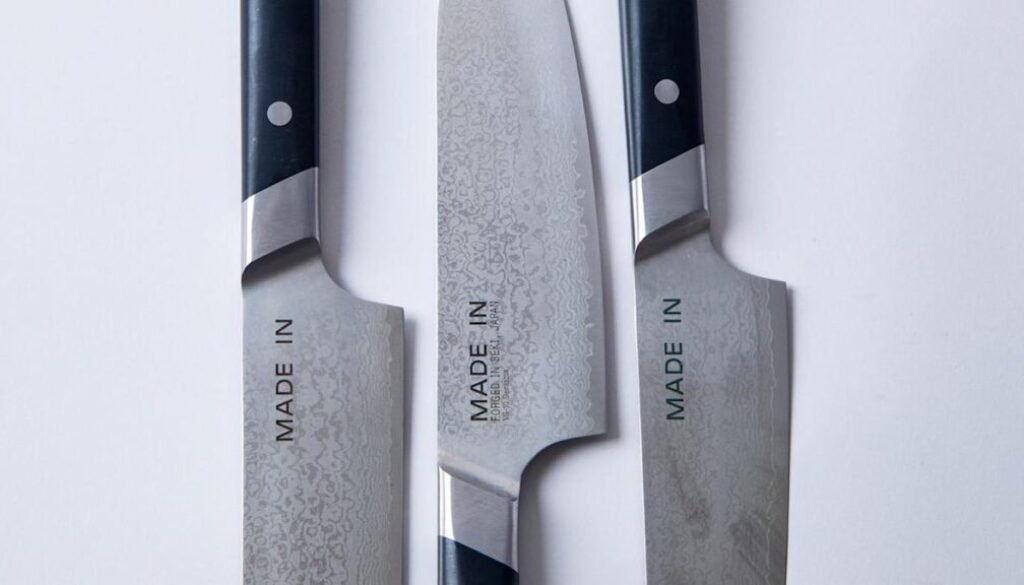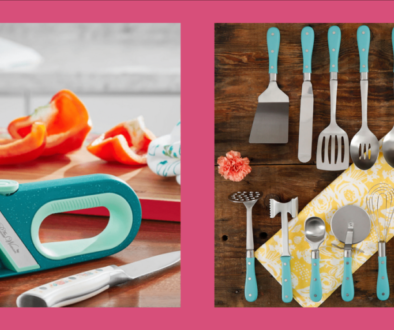These Japanese Damascus-Steel knives are my favorite cooking tools
[ad_1]
If you cook, you use knives. There is no way to get around this. Regardless of your food preferences and restrictions, your kitchen of choice or even the skill level, you need a reliable knife each time you cook. If you cook every day, you need a set of knives – knives that will make clean cuts, feel good in your hand and remain sharp. Thank God, I found mine. I don't cook anything anymore without using my trifles in Damascus hills.
This three -talented knife set includes a Santoku, a Nakiri and a gyuto all forged in Seki, Japan, using Damascus Steel. They are magnificent, each with a unique pattern through the blade. You don't need to be an expert in Japanese knives to appreciate the whole or even know how to use them. The main thing is that you get a knife from a western style chief (the gyuto), a versatile Japanese style (Santoku) and a rectangular nakiri, which specializes in the cut of fish and vegetables.
Each individually would be a well -allowed addition to my collection of knives. As a game, they are enough to have my old knives sell me and start from scratch. Although buying them in a package does not make you a lot of favorites in terms of price, it may be the movement if you are looking to add a touch of elegance (clear) to your kitchen utensils.

Florence Sullivan
A pro knife an amateur can enjoy
Made in East, essentially, a brand of dishes approved my all my favorite celebrity chiefs and Top chef Alums. But I couldn't leave my huge crush on Brooke Williamson, nor the fact that Tom Colicchio is my father of television, bothers my judgment. So have I thought from the jump that this set of Damascus-Steel blades was magnificent? Of course, but I had to discover for myself how they cut, how they felt and how much they were cleaning.
First of all: these are sharp knives, which is a good thing. I might have given myself a few cuttings for cleanser because, frankly, I am not used to using those of this caliber, but a sharp knife is actually safer than a dull knife. Once I started my preparation work, each next cut was smooth and precise.
Each of the three knives has a similar weight, and they are exceptionally well weighted. The handles are heavier than the blades, which makes the center of gravity just, or slightly in front, where you naturally grasp a knife. It gives the knife a nice rocking movement, which facilitates the cut of an entire mound of vegetables without any wrist pain. For my hands, this refined weight helped me reach more coherent cuts, and I found my knife less likely to stop halfway through a piece of half-tranche meat.
It only took a few meals before using the three. I couldn't find much to complain. I still can't. In other words, these magnificent knives are as precise and elegant as they seem.
As I cook more with them, I gravitate the most to the Santoku. If you only get a fact of the knives, this is the one I would recommend. Its slightly more rounded tip actually more a versatile tool than the cutting edge gyuto, because I do not make a ton of tasting and that is why the tip of a chef's knife is made. And although Nakiri is the traditional Japanese choice to cut vegetables, I find that the Santoku works as well. If I am honest, most of my knife time has passed the vegetables, so I'm not upset to have two damask steel knives perfectly perfected for the task.
Japanese Damascus Santoku in steel

$ 199.00 on MadeinCookware.com
Treat them with care and they will treat you in kind
Even the best knives can degrade and show wear quickly, even after only a handful of uses – if you don't care. The annoying particles can turn to stains overnight if you don't wash properly. It can transform a magnificent knife into a permanent reminder of your error. Quite exhilarating things, I know.
This is true for the strong knives of Made in, too, but I found them, at all levels, to better hold my washes occasionally precipitated. My average totally, but even less than stellar, care does me very well to test these things. Whether I crumble too hard or I don't use enough hot water (or I'm just too impatient to let the knife soak), the more I seek, the more I realize. I realize.
We have turned the photos for this criticism after using the whole for several weeks. Go, check them and see if you can see major imperfections. What you see is what you are going to get. So far, these knives have remarkably kept their shine and sharpness.

Florence Sullivan
Final verdict – a cut above
Although far from a starter in terms of prices and number of products, the Made in Damascus-Steel collection with three elbows hangs with the naked essential elements. The refined and elegant versions of the essential elements are sometimes everything you need.
Japanese damask steel knives

$ 569.00 on MadeinCookware.com
You might also love
[ad_2]




